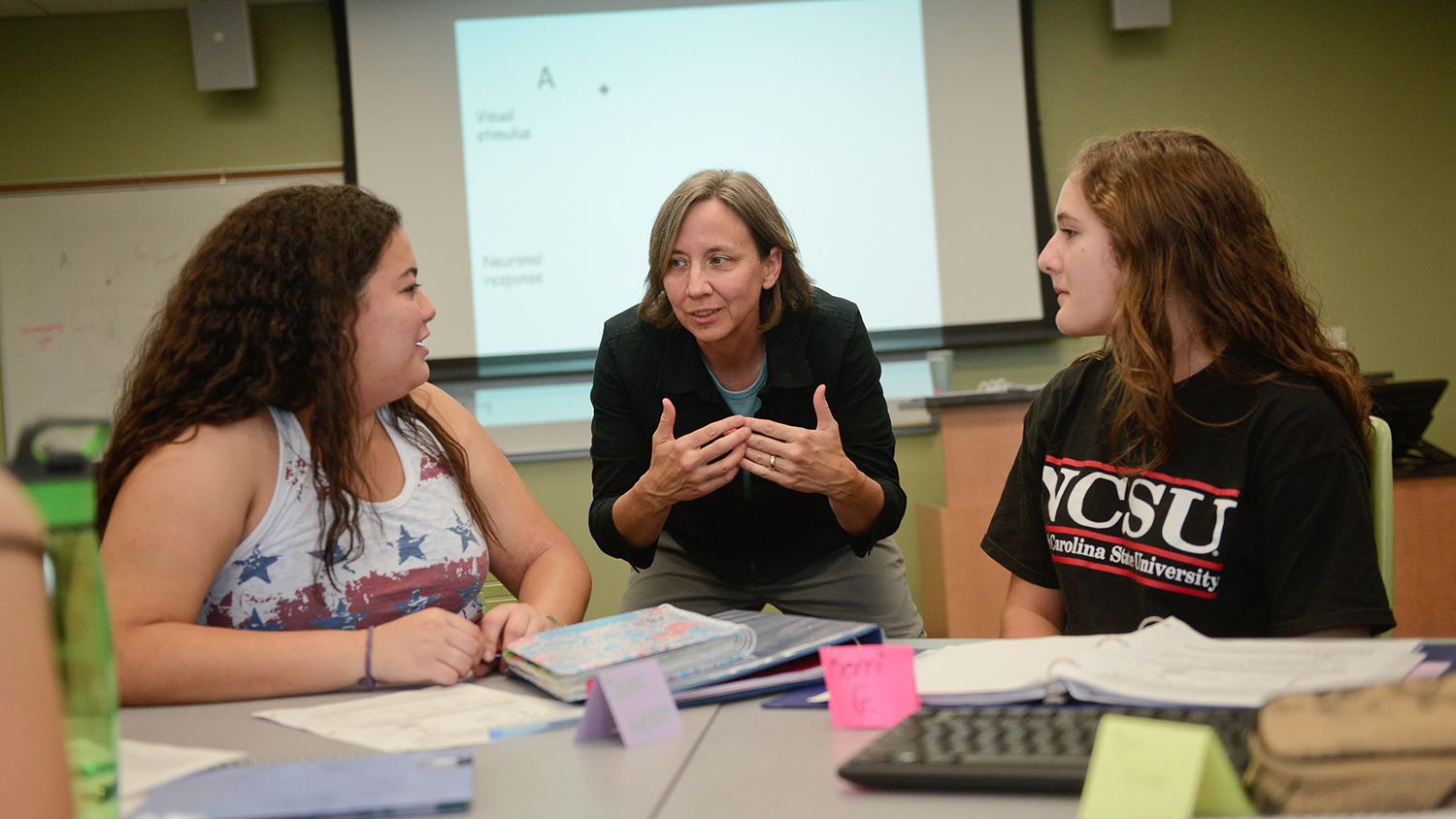Pack Hacks for Faculty: Connecting with First-Year Students

Welcome back to Pack Hacks for Faculty. Each month, a member of the NC State faculty will provide quick tips, advice and other insight to facilitate your teaching, research, scholarship or engagement activities. If you are interested in making a submission for a future Pack Hacks for Faculty, please review our submission guidelines and contact provost-communications@ncsu.edu if you have questions.
This month, Kimberly Bush, director of undergraduate programs and teaching associate professor; and Michael Kanters, interim department head and professor in the Department of Parks, Recreation and Tourism Management, give advice on how to help Spring Connect students make a successful transition to NC State.
Connecting With First-Year Students
Kimberly Bush and Michael Kanters
 Spring Connect welcomes first-year students who were admitted to NC State the previous spring or fall to begin at NC State in January. This semester, more than 300 students arrived on campus for the first time. As faculty, we want to welcome these students to the start of their undergraduate career and help them feel at home in a new place.
Spring Connect welcomes first-year students who were admitted to NC State the previous spring or fall to begin at NC State in January. This semester, more than 300 students arrived on campus for the first time. As faculty, we want to welcome these students to the start of their undergraduate career and help them feel at home in a new place.
We do that for Spring Connect students by teaching PRT 150 Parks, Recreation and Tourism Management Orientation, and ENV 100 Student Success in Environmental First Year, designed to introduce students to college life and equip them with the necessary skills for personal and academic growth. Here are some of our tips on how to help your Spring Connect students succeed.
Create Ground Rules for Classroom Interactions
 The ideas presented here can be extended to all students, but they’re beneficial in helping Spring Connect students establish ideas of what college should be like. Set ground rules within the classroom for interactions among students. This includes communicating the value of respecting fellow classmates and instructors, and the ideas presented during class. Everyone’s opinion matters in this setting, so create opportunities for all students to talk and engage with the material. The Office of Institutional Equity and Diversity also provides some wonderful resources for creating and maintaining a diverse and inclusive environment to achieve these goals.
The ideas presented here can be extended to all students, but they’re beneficial in helping Spring Connect students establish ideas of what college should be like. Set ground rules within the classroom for interactions among students. This includes communicating the value of respecting fellow classmates and instructors, and the ideas presented during class. Everyone’s opinion matters in this setting, so create opportunities for all students to talk and engage with the material. The Office of Institutional Equity and Diversity also provides some wonderful resources for creating and maintaining a diverse and inclusive environment to achieve these goals.
Create an Engaging Course
Integrate activities into your syllabus that not only help acclimate students to university life, but also help them think more critically about what they do, when and why. Here are a few ideas:
- Have students keep a time diary. When students jot down how they’re spending their time each day, they can see where they need more focus and where they can cut back. Time management can present a big learning curve for students on their own for the first time, and reflecting on these matters helps them focus on growing in maturity and recognizing how different college is from high school.
- Have students write a letter to themselves. Ask them to write about their feelings of being accepted to NC State, starting in the spring, and encountering so many new experiences. Have them talk about what makes them excited and nervous, and what their goals are. A common theme from students who completed this activity was that they initially felt frustrated to be starting in the spring. This created an open discussion among students about how it was ok to experience these feelings, and students revealed that they now felt excited, proud and happy to be on campus. By processing their feelings and sharing them with the class, they can feel more comfortable with open expression and bonding with classmates.
- Make getting to know campus fun. Have students review a campus map, ask them to circle places they will need to go throughout the semester, and figure out what they’ll need to do to get there, and what resources are available to them at these locations. If you have time, take a tour of campus to see where resources — like the Student Health Center, Counseling Center, recreation areas, etc. — are located.
Get Students Talking
Let your students know that your classroom is a safe place for expressing their goals, concerns and ideas about what college is/should be like. Sometimes having your students face each other by sitting or arranging desks in a circle can help facilitate open conversation. Bring up topics like mental health awareness, how to handle stress, dealing with homesickness and more — these types of topics are very important in getting to know your students and helping them know themselves and their needs better.
Demonstrate So Students Can Emulate
Show your students that you are a resource in and outside of class. Emphasize openness in communication, and demonstrate behaviors that you want your students to model. When students reach out with pertinent questions and concerns, we should be open to hearing from them and available (within reason) to respond. When students see that you genuinely care about them, they will confide in you. That follow-through is important and sets the tone for the entire semester.
Showcase NC State’s Resources
First-year students are all making major adjustments when it comes to going to college. Spring Connect students may have additional concerns with their peers having already been on campus and forming relationships for four months. Let them know that there are myriad resources at their disposal to help them not just adjust, but to thrive. Here are a few helpful links:
- Academic Services
- Division of Academic and Student Affairs
- Counseling Center
- Office for Institutional Equity and Diversity
- Campus Community Centers
- New Student Programs
- Student Services Center
Kimberly Bush is the director of undergraduate programs and a teaching associate professor in the Department of Parks, Recreation and Tourism Management in the College of Natural Resources. She can be reached at kabush@ncsu.edu.
Michael Kanters is the interim department head and a professor in the Department of Parks, Recreation and Tourism Management in the College of Natural Resources. He can be reached at mkanters@ncsu.edu.
- Categories:


